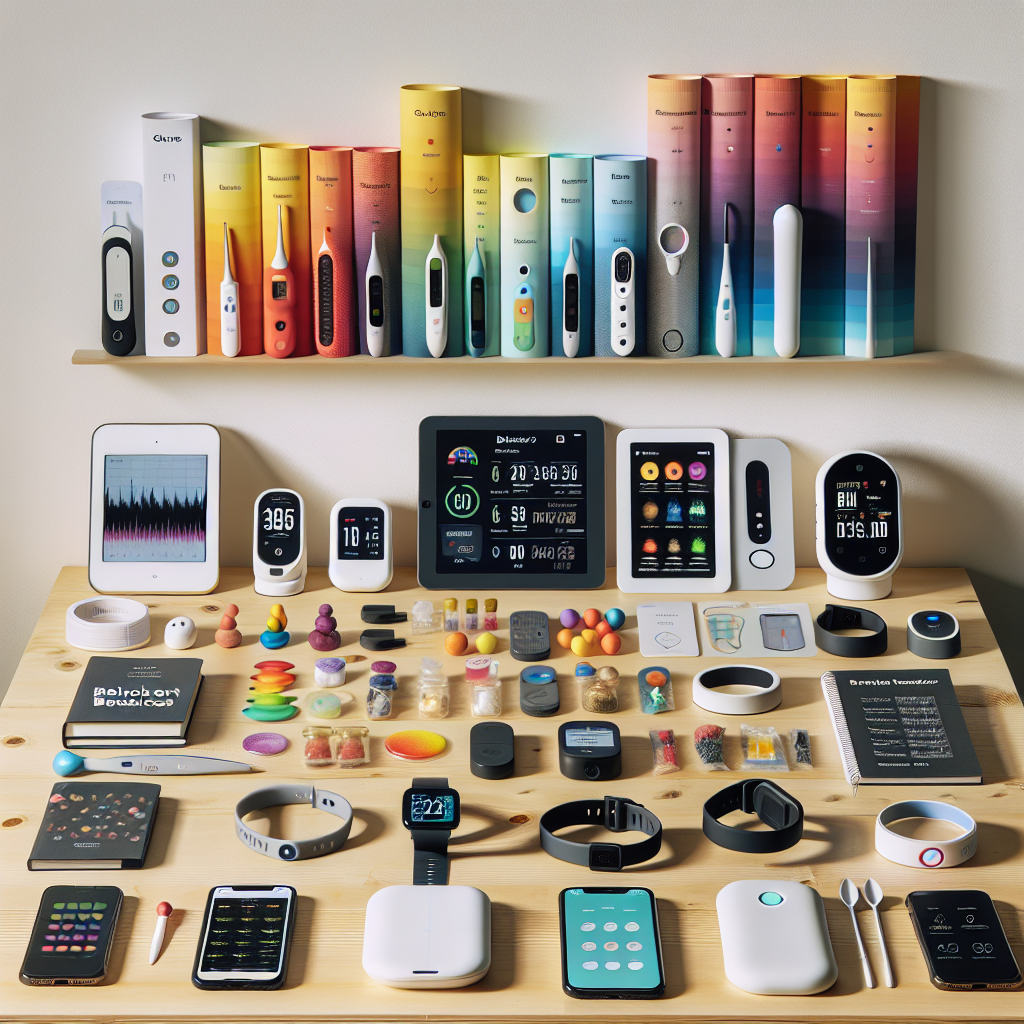
Unlock Your Body’s Potential with Biohacking Devices
Imagine having the power to fine-tune your body and mind to their peak potentials. Biohacking devices are the key to unlocking that power. These tools measure, track, and analyze your body’s data to help you make informed decisions about your health and well-being.
Key Takeaways
- Discover how biohacking devices can transform your health.
- Learn about the most effective gadgets for nutrition, fitness, cognitive function, and sleep.
- Understand the importance of precise measurements in biohacking.
- Explore the top devices that monitor your health and help you achieve your goals.
- Find out why fitness trackers are an essential part of any biohacker’s toolkit.
What is Biohacking?
Biohacking is all about personal optimization. It’s a proactive approach to making lifestyle changes that can dramatically improve your physical and mental performance. Whether it’s a device that helps you monitor your sleep, a gadget that gives you real-time feedback on your diet, or a tool that sharpens your cognitive abilities, biohacking is about taking control of your own biology.
The Role of Measurement in Biohacking
Measurement is at the heart of biohacking. Without accurate data, it’s like navigating without a map. These tools provide the insights you need to understand your body better and make changes that count. By tracking progress and identifying patterns, you can tailor your biohacking efforts for maximum impact.
Top Biohacking Devices for Monitoring Health
Health monitoring is a cornerstone of biohacking. With the right devices, you can keep a pulse on vital health metrics and adapt your lifestyle for optimal health. Let’s explore the devices that are changing the game for biohackers everywhere.
Fitness Trackers: More Than Just Step Counting
Fitness trackers have evolved. They’re no longer just about counting steps; they’re sophisticated health monitors. These devices can track your heart rate, monitor your sleep, and even measure your stress levels. They provide a comprehensive view of your daily activity and health, allowing you to make informed decisions about your exercise, rest, and recovery.
- Heart Rate Monitoring: Understand how your heart responds to different activities.
- Sleep Tracking: Get detailed reports on your sleep patterns and quality.
- Stress Analysis: Learn how your body reacts to stress and find ways to relax.
- Activity Logs: Keep track of your workouts and daily movements.
- Health Insights: Receive personalized tips based on your data.
- Goal Setting: Set and achieve your fitness and health goals.
- Integration: Sync your data with other health apps for a holistic view.
Smart Scales: Understanding Your Body Composition
Smart scales do more than tell you your weight; they give you a full report on your body composition. This includes your body fat percentage, muscle mass, bone density, and water percentage. By stepping on a smart scale, you get a clearer picture of what’s happening inside your body beyond the number on the scale. This information is crucial for tailoring your diet and exercise to achieve your specific health goals.
- Body Fat Percentage: Pinpoint how much fat you need to lose or gain.
- Muscle Mass: Ensure you’re building muscle, not just losing weight.
- Bone Density: Keep your bones strong by tracking their health.
- Water Percentage: Stay hydrated by monitoring your water levels.
Sleep Monitors: Decoding Your Rest Patterns
Quality sleep is non-negotiable for a well-functioning mind and body. Sleep monitors help you understand your sleep patterns and identify disruptions. They track the duration and quality of your sleep, including how much time you spend in each sleep stage. With this data, you can adjust your bedtime routine, sleeping environment, and daily habits to improve your sleep quality and, as a result, your overall health.
Example: After using a sleep monitor for a week, John noticed he was consistently waking up during deep sleep, feeling groggy. By adjusting his sleep schedule and environment, he was able to wake up during lighter sleep stages, feeling more refreshed.
Optimize Your Nutrition with These Tools
Nutrition is a key element of biohacking. The right tools can help you understand what nutrients you’re getting and what you’re missing. Let’s look at devices that can help you optimize your nutrient intake for better health and performance.
Glucometers: Tracking Blood Sugar Levels
Glucometers are not just for diabetics. They’re a powerful tool for anyone interested in biohacking their diet. By measuring your blood sugar levels before and after meals, you can understand how different foods affect your body. This can help you make smarter food choices, stabilize your energy levels, and manage your weight more effectively.
For example, Sarah used a glucometer to discover that her “healthy” breakfast cereal was causing a spike in her blood sugar levels. She switched to a high-protein breakfast and felt more energized throughout the day.
Food Scanners: Analyzing Nutrient Intake
Food scanners take the guesswork out of nutrition. These devices analyze the chemical makeup of your food to provide you with detailed information about its nutrient content. By scanning your meals, you can ensure you’re getting the right balance of vitamins, minerals, and macronutrients to support your biohacking goals.
- Vitamins and Minerals: Make sure you’re hitting your daily requirements.
- Macronutrients: Balance your intake of carbs, fats, and proteins.
- Food Quality: Choose foods that are nutrient-dense and beneficial for your health.
Biohacking Your Brain: Cognitive Enhancement Tools
Your brain is your most valuable asset, and cognitive enhancement tools are like a gym for your mind. These devices and apps are designed to improve your memory, attention, and overall brain function. Whether it’s through brain training games, neurofeedback devices, or meditation headbands, optimizing your cognitive abilities is a crucial part of biohacking.
Neurofeedback Devices: Training for Brain Performance
Neurofeedback devices are like personal trainers for your brain. They work by providing real-time feedback on brain activity, allowing you to train your mind to become more focused and resilient. By using sensors to monitor brain waves, these devices can guide you through exercises that help reduce anxiety, improve attention, and enhance cognitive function. It’s a hands-on approach to mental fitness that can lead to lasting changes in brain behavior.
- Focus Enhancement: Train your brain to maintain attention during tasks.
- Anxiety Reduction: Learn to control your stress response.
- Cognitive Flexibility: Improve your ability to switch between tasks.
- Brain Wave Regulation: Balance different types of brain activity for optimal performance.
Meditation Headbands: Finding Your Zen
Meditation headbands are revolutionizing the way we approach mindfulness. These wearable devices measure brain activity to provide feedback on your meditation practice. They help you understand when your mind is calm or active and guide you back to a state of focus. With regular use, these headbands can help you develop a more consistent and effective meditation routine, leading to greater emotional balance and stress management.
- Real-Time Feedback: Know when you’re in the zone or when your mind wanders.
- Progress Tracking: Monitor improvements in your meditation practice over time.
- Guided Sessions: Follow along with meditation exercises tailored to your needs.
- Emotional Well-being: Cultivate a sense of inner peace and resilience.
Advanced Biohacking: Next-Level Devices To Try
For those who are ready to take their biohacking journey to new heights, advanced devices offer deeper insights and more personalized data. These tools dive into the complexities of your body’s inner workings and provide actionable information that can lead to profound health transformations.
DNA Test Kits: Unveiling Genetic Insights
DNA test kits are a window into your genetic blueprint. They can reveal predispositions to certain health conditions, insights into your metabolism, and even your response to different types of exercise and diet. Armed with this knowledge, you can make lifestyle choices that are in harmony with your genetic makeup, optimizing your health at the most personal level.
- Health Risk Assessment: Identify genetic markers that may indicate health risks.
- Dietary Recommendations: Tailor your nutrition based on your genetic needs.
- Fitness Planning: Choose workouts that align with your genetic strengths.
- Ancestry Information: Explore your heritage and connect with your roots.
Metabolism Analyzers: Personalized Energy Expenditure Data
Metabolism analyzers take the guesswork out of dieting and fitness by providing precise data on your body’s energy expenditure. These devices can measure your resting metabolic rate and how many calories you burn during various activities. With this information, you can create a diet and exercise plan that’s perfectly calibrated to your body’s unique energy needs.
- Caloric Burn Measurement: Track how many calories you burn throughout the day.
- Metabolic Health: Get insights into your metabolic rate and how it affects weight management.
- Activity Optimization: Find out which exercises give you the best energy burn for your effort.
- Personalized Nutrition: Adjust your food intake based on your metabolic data.
Choosing Your Biohacking Tools Wisely
Selecting the right biohacking tools is crucial for getting accurate data and achieving your health goals. It’s important to consider factors such as accuracy, compatibility, and cost when making your choices. Here’s how to ensure you’re investing in devices that will truly benefit your biohacking journey.
- Research: Look for reviews and studies that back up the device’s claims.
- Accuracy: Choose devices with a proven track record of reliable measurements.
- Compatibility: Ensure the device works with your existing technology and lifestyle.
- Usability: Select tools that are user-friendly and easy to incorporate into your daily routine.
- Support: Opt for devices with good customer support and community backing.
- Updates: Consider whether the device receives regular updates to improve functionality.
- Cost-Effectiveness: Balance the price of the device with the value it provides.
By keeping these considerations in mind, you’ll be well on your way to assembling a toolkit that empowers you to take control of your health and push the boundaries of what your body and mind can achieve.
Accuracy and Reliability
When it comes to biohacking, precision is key. You need devices that give you data you can trust. This means looking for tools that have been validated through research and come with high precision sensors. It’s not just about numbers; it’s about numbers you can rely on to make informed decisions about your health. Always check for clinical validations and read user experiences to gauge the accuracy and reliability of the devices you’re considering.
Remember, even the most expensive device is useless if it doesn’t provide accurate data. It’s worth investing in devices that have a reputation for reliability.
Compatibility with Other Devices
Your biohacking tools should play well with others. Compatibility with other devices and apps is essential for a seamless experience. Look for devices that can sync with your smartphone or computer, and integrate with other health apps you’re using. This will help you create a comprehensive health dashboard that brings together all your data in one place, making it easier to track progress and spot trends.
For instance, if your fitness tracker can sync with your nutrition app, you’ll have a more complete picture of how your diet and exercise are working together to improve your health.
Price vs. Performance
More expensive doesn’t always mean better, but it’s important to find the sweet spot between cost and functionality. Sometimes, shelling out a bit more upfront can save you from the hidden costs of cheaper, less reliable gadgets that need frequent replacements. Balance your budget with your biohacking goals and choose devices that offer the best performance for their price point.
Consider it an investment in yourself. A reliable device that lasts longer and provides accurate data can be more cost-effective in the long run.
FAQ
What Are the Best Devices for Beginners in Biohacking?
If you’re just starting out, simplicity is your friend. Look for devices that are easy to use but still offer valuable insights. A basic fitness tracker that monitors steps, heart rate, and sleep, or a simple food tracking app to log your meals, can be great starting points. As you get more comfortable, you can gradually add more sophisticated tools to your arsenal.
- Oura Ring: A sleep and activity tracker that’s both comprehensive and user-friendly.
- MyFitnessPal: An app that makes tracking your food intake straightforward and informative.
- Fitbit: A range of fitness trackers that cater to beginners with an intuitive interface.
How Can I Ensure the Accuracy of My Biohacking Devices?
To ensure the accuracy of your devices, regularly calibrate them if required, keep them clean and well-maintained, and follow the manufacturer’s instructions for use. Additionally, cross-reference their data with other methods or devices when possible. For example, compare your fitness tracker’s heart rate readings with those from a chest strap monitor or manually check your pulse.
Always update your devices’ software to the latest version, as manufacturers often release updates that improve accuracy and add new features.
What’s the Difference Between a Fitness Tracker and a Smart Scale?
Understanding the tools at your disposal is crucial for effective biohacking. Fitness trackers and smart scales, while both valuable, serve different purposes. A fitness tracker is like your daily companion, monitoring your physical activities, heart rate, and sleep quality. It’s wearable, always on, and provides a dynamic picture of your health as you move through your day.
On the other hand, a smart scale is more of a checkpoint. You might visit it once a day, usually in the morning, to measure your weight and body composition. It’s a static measurement tool that gives you a snapshot of your body’s current state, including fat percentage, muscle mass, and sometimes even water content and bone density.
- Fitness Trackers: Wearable, dynamic, and track various health metrics throughout the day.
- Smart Scales: Stationary, provide a snapshot of your body composition at a single moment.
Both devices sync with apps to track progress over time, but they give you different insights into your health and fitness journey.
Can Biohacking Devices Improve My Sleep Quality?
Yes, biohacking devices can significantly improve your sleep quality. Devices like sleep monitors and smart mattresses provide actionable insights into your sleep patterns. They can track the stages of sleep you cycle through, the number of times you wake up, and even your breathing and heart rate while you sleep. This data can help you identify factors that may be disrupting your rest, such as room temperature, light levels, or lifestyle habits.
By making informed adjustments based on this data—like changing your sleep environment or tweaking your bedtime routine—you can enhance the quality of your sleep. And since sleep is foundational to overall health, these improvements can have a ripple effect, boosting your mood, cognitive function, and physical performance.
For example, Jenna discovered through her sleep tracker that she was waking up frequently during the night. After experimenting with different room temperatures and bedding, she found her optimal sleep setting and now wakes up feeling refreshed and alert.
Are Expensive Biohacking Tools Necessarily Better?
Not necessarily. The price tag on biohacking tools can be a reflection of brand, features, or design, but it’s not always an indicator of quality or effectiveness. What matters most is how well a tool meets your specific needs and goals. A more affordable device that provides the data you need to make positive changes can be far more valuable than a high-end gadget with features you’ll never use.
Before making a purchase, assess what metrics are most important for your biohacking objectives. Read reviews, compare specifications, and consider the credibility of the brand. Sometimes, a mid-range tool with a strong user community and robust support can offer the best balance between cost and functionality.
As you embark on your biohacking journey, remember that the ultimate goal is not to have the most gadgets, but to gain a deeper understanding of your body and mind. It’s about making small, data-driven tweaks to your lifestyle that add up to significant improvements in your well-being. With the right tools in hand, there’s no limit to what you can achieve. Happy biohacking!


